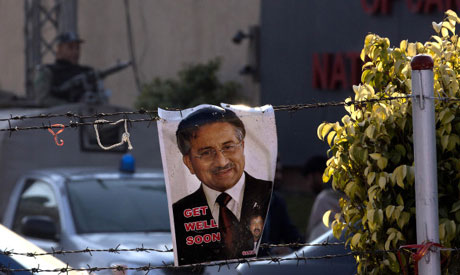
Supporters of Pakistan's former president and military ruler Pervez Musharraf hang a poster of their leader outside the Armed Forces Institute of Cardiology where Musharraf is admitted in Rawalpindi, Pakistan, Thursday, Jan. 9, 2014 (Photo: AP)
A pivotal moment in Pakistan's history or a side-show with a pre-determined outcome? The treason trial of ex-military ruler Pervez Musharraf has divided opinions in a country where the army has rarely been shy about seizing power.
The case has hogged the limelight among the country's hyperactive TV channels for over a month and a half, with every legal manoeuvre announced on breaking-news tickers and analysed in great detail in the popular evening news shows.
The coverage is stoked by the potentially high stakes: the supremacy of civilian rule in a country that has been governed for more than half its history by the military, with three coups since it gained independence from Britain in 1947.
"Fundamentally there is a desire by the civilians to hold the military accountable and this trial is very symbolic, because here is a man who violated the constitution not once but twice," said Raza Rumi, a senior fellow at the Jinnah Institute think tank.
The ongoing case, he adds, is "like a sword on the military's head because the military cannot let its chief be tried for treason and punished -- that will be the end of its hegemony. And (Prime Minister) Nawaz Sharif knows this and as a smart politician he wants this to be there... so that the military is kept in check."
It began with a bang on November 17, when Interior Minister Chaudhry Nisar gathered the press on a Sunday to announce that Musharraf, a former army chief who seized power in a bloodless coup in 1999 and ruled until 2008, would be tried by a special court for "high treason".
The charge, which carries the maximum penalty of the death sentence, relates to Musharraf's suspension of the constitution in 2007 and the imposition of emergency rule, at a time when his rule was being increasingly challenged by the judiciary.
Musharraf returned to Pakistan in March last year following more than four years in self-imposed exile, declaring he had come to save his homeland.
But he soon found himself caught up in a legal quagmire, accused among other things of the murder of his rival, former premier Benazir Bhutto, the extra-judicial killing of a Baluch rebel leader and the sacking of judges in 2007.
Confined to his luxury residence on the outskirts of the capital, he was also barred from participating in May elections, which ironically saw Sharif -- the man he ousted in a 1999 coup -- return to power.
Musharraf had won bail in all the cases against him in early November, though was still barred from leaving the country. A few days later, with the country still reeling from a flare-up in Sunni-Shiite violence that saw dozens of deaths, the government dropped its bombshell announcement.
The unprecedented trial has the potential to be a game-changer, but has upset many mid-level army officers who resent seeing their former chief being humiliated, according to several analysts.
"The army don't want him dragged into this special tribunal, (because) he is a general, he is a former army chief, the next thing you know you will be dragging every army chief in to court," said Ayesha Siddiqa, a prominent military analyst.
On two occasions when Musharraf was due in court the next day, security forces announced they had found explosives -- unconnected to detonators -- close to his residence. His lawyers immediately invoked the security threat to justify their client's absence from proceedings.
Last week, as he was finally making his way to the court, the former president developed a heart condition and was diverted to a military hospital. He was diagnosed with coronary artery disease, with his lawyers pleading for treatment abroad.
The developments have fed observers' doubts that the case will be seen through to completion.
"The military has been protecting him, is protecting him and will continue to protect him not because the generals like him entirely. It's because it is a rule of conduct," argues Siddiqa.
She sees the process as a "diversion" orchestrated by the Sharif government to distract from its inability to tackle ongoing terror attacks and a chronic energy crisis, and which is aware that it cannot push the all-powerful army too far, even if it appears outwardly to be pursuing a tough stance.
The government and the army will eventually reach an agreement that allows both of them to save face, many analysts argue.
"It is a dilemma for the government, having initiated all this... Should they really proceed and bring it to its logical end or allow him to go?" said Talat Masood, a retired general and analyst.
"I think they are trying to figure it out... the final decision has not been taken otherwise there would have been some clear picture emerging."
Short link: